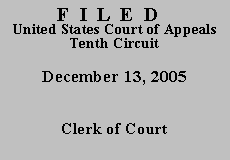

|
NICHOLAS F. WORCESTER,
v.
WALTER DINWIDDIE |
|
Before BRISCOE, LUCERO and MURPHY, Circuit Judges.
In his § 2241 petition, Worcester asserted that the Oklahoma Department of Corrections miscalculated his entitlement to "sentence credits," i.e., good conduct and work credits, in violation of the Due Process and Ex Post Facto Clauses of the United States Constitution. The district court concluded Worcester's claim was barred by the statute of limitations set out in 28 U.S.C. § 2244(d). In particular, the district court noted that because it was clear from the record that Worcester was aware of the factual predicate underlying his claim well before the effective date of § 2244, the limitations period expired on April 23, 1997. 28 U.S.C. § 2244(d)(1)(D) (providing that a one-year limitation period, running from the date on which the factual predicate underlying the claim could have been discovered, shall apply to habeas petitions filed by state court prisoners); Hoggro v. Boone, 150 F.3d 1223, 1225-26 (10th Cir. 1998) (establishing a grace period for prisoners whose limitations period would have otherwise expired prior to the effective date of § 2244(d); those individuals had until April 23, 1997 to file their habeas petitions). The district court further concluded Worcester was not entitled to benefit from statutory tolling, 28 U.S.C. § 2244(d)(2), because he did not file a state petition until after the federal limitations period had already run. Fisher v. Gibson, 262 F.3d 1135, 1142-43 (10th Cir. 2001). Finally, the district court concluded Worcester was not entitled to equitable tolling because he had not diligently pursued his claims. Miller v. Marr, 141 F.3d 976, 978 (10th Cir. 1998).
A COA may issue if Worcester "has made a substantial showing of the denial of a constitutional right." 28 U.S.C. § 2253(c)(2). To make this showing, Worcester must demonstrate "that reasonable jurists could debate whether (or, for that matter, agree that) the petition should have been resolved in a different manner or that the issues presented were adequate to deserve encouragement to proceed further. Miller-El v. Cockrell, 537 U.S. 322, 336 (2003) (quotation omitted). In evaluating a request for a COA, it is not the role of this court to engage in a "full consideration of the factual or legal bases adduced in support of the claims." Id. Instead, this court undertakes "a preliminary, though not definitive, consideration of the [legal] framework" applicable to each claim. Id. at 338. Worcester is not required to demonstrate that his appeal will succeed to be entitled to a COA. He must, however, "prove something more than the absence of frivolity or the existence of mere good faith." Id. (quotations omitted).
Where, as is the case here, the district court denies a habeas petition on procedural grounds without reaching the underlying constitutional claim, a COA may issue only if Worcester shows both (1) reasonable jurists would find it debatable whether the petition states a valid claim of the denial of the constitutional right, and (2) reasonable jurists would find it debatable whether the district court was correct in its procedural ruling. Slack v. McDaniel, 529 U.S. 473, 484 (2000). This court may deny a COA on either of these two prongs. Id. at 485. We review for abuse of discretion a district court's decision whether or not to equitably toll § 2244(d)'s one-year limitations period. Burger v. Scott, 317 F.3d 1133, 1141 (10th Cir. 2003).
This court has reviewed Worcester's application for a COA and appellate brief, the district court's order, and the entire record on appeal pursuant to the framework set out by the Supreme Court in Miller-El and concludes that Worcester is not entitled to a COA. The district court's resolution of Worcester's petition on the basis of the statute of limitations set out in § 2244(d) is not reasonably subject to debate and the claim is not adequate to deserve further proceedings.(*) Likewise, the district court's decision that Worcester is not entitled to equitable tolling is not an abuse of discretion. Accordingly, Worcester has not "made a substantial showing of the denial of a constitutional right" and is not entitled to a COA. 28 U.S.C. § 2253(c)(2).
This court DENIES Worcester's request for a COA and DISMISSES this appeal.
Entered for the Court
CLERK, COURT OF APPEALS
By
Deputy Clerk
*.Even liberally construing his pleadings, both before the district court and this court, Worcester has never contended that there exists some kind of "continuing violation" exception to the limitations period set out in § 2244(d). Accordingly, this court does not address that question. Meade v. Grubbs, 841 F.2d 1512, 1526 (10th Cir. 1988) (holding that pro se litigants are entitled to a liberal construction of their pleadings); Farmers Ins. Co. v. Hubbard, 869 F.2d 565, 570 (10th Cir. 1989) (holding that, absent extraordinary circumstances, issues not raised below will not be heard on appeal); National Commodity & Barter Ass'n v. Gibbs, 886 F.2d 1240, 1244 (10th Cir. 1989) (holding that this court will not manufacture issues for appellants).